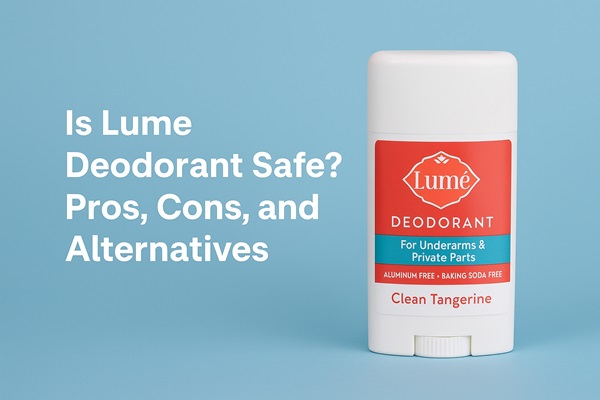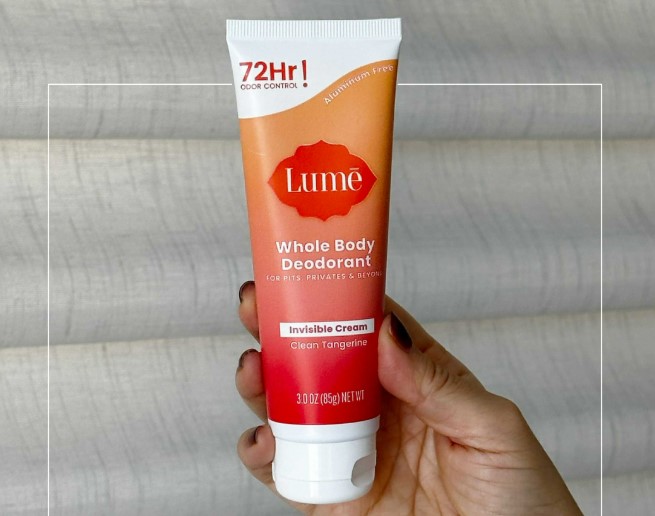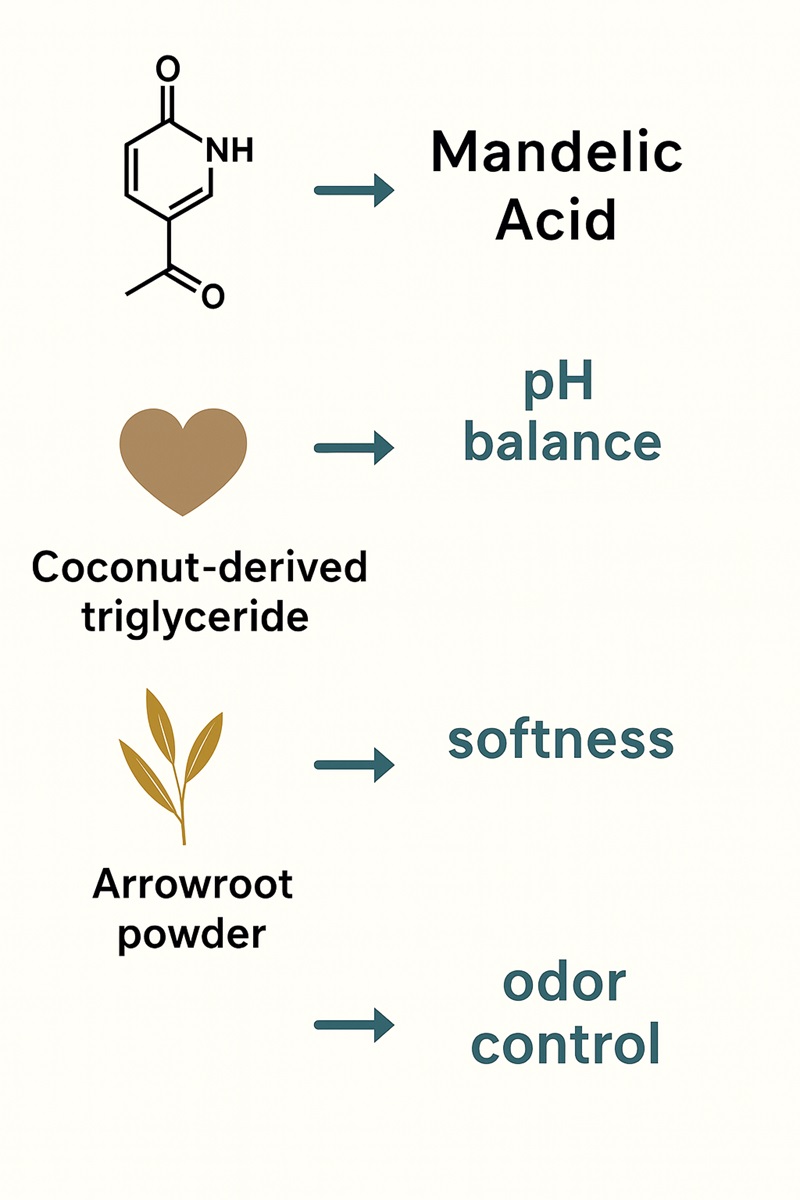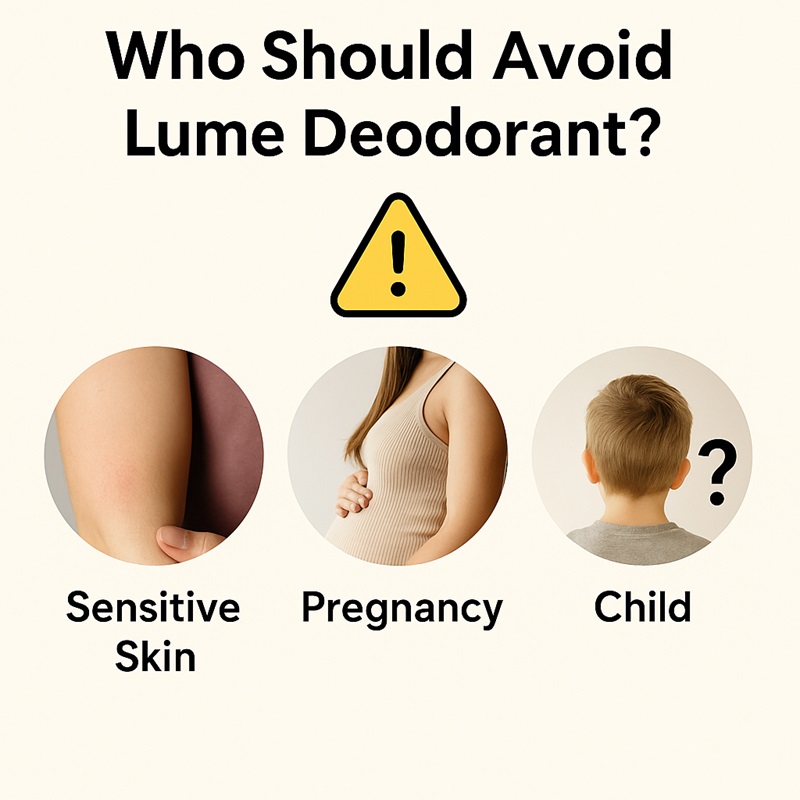Staying fresh without exposing your body to questionable chemicals is now a top priority for many consumers. Among the wave of “clean” and “aluminum-free” deodorants, one brand stands out: Lume. It’s advertised as doctor-developed, whole-body safe, and effective for up to 72 hours. But the real question people ask is: is Lume deodorant safe?
This guide takes a close look at what’s inside Lume, what the label really means, how it compares to other deodorants, and what experts say about its safety.
Is Lume Deodorant Safe? Quick Answer
Yes — Lume deodorant is considered safe for most users. It contains no aluminum, parabens, phthalates, or baking soda, and instead relies on mandelic acid to neutralize odor-causing bacteria. However, people with very sensitive skin, fragrance allergies, or specific medical conditions may experience irritation and should patch test before full use.
What Is in Lume Deodorant?
Lume is marketed as a whole-body deodorant that can be applied underarms, on feet, and even private areas. Unlike antiperspirants, it does not block sweat glands. Instead, it reduces odor by altering skin pH and making it harder for bacteria to thrive.
Who Owns Lume Deodorant?
Lume was created by Dr. Shannon Klingman, a gynecologist who developed the formula to be safe for intimate areas. In 2021, Lume was acquired by Harry’s Inc., the personal care company behind Harry’s razors and Flamingo body products.
Lume Deodorant Ingredients (Chemistry + Skincare Lens)
Here’s a breakdown of some key ingredients and how they work:
- Mandelic Acid – A gentle alpha hydroxy acid that lowers pH to inhibit odor-causing bacteria.
- Caprylic/Capric Triglyceride – A coconut-derived emollient that softens skin.
- Arrowroot Powder & Tapioca Starch – Natural absorbents that reduce wetness.
- Candelilla Wax – Plant-based stabilizer that gives texture.
- Fragrance & Essential Oils – Provide scent; potential trigger for sensitive users.
Is Lume Deodorant Natural?
Lume uses both naturally derived and synthetic ingredients. While not 100% natural, it avoids many controversial additives (aluminum, parabens, sulfates, talc, and baking soda). Its hybrid formula prioritizes balance: effective odor control without the harshness of high-pH baking soda.
What the Label Really Means
Lume’s packaging highlights phrases like aluminum-free, baking soda-free, whole-body safe, doctor-developed, and 72-hour odor control. Here’s what those claims mean in practice:
- Aluminum-Free → Lume won’t block sweat; it reduces odor instead.
- Baking Soda-Free → Less risk of skin irritation compared to some “natural” brands.
- Doctor-Developed → Formulated by a gynecologist, but not FDA-approved.
- Whole-Body Safe → Marketed for underarms, feet, and intimate areas — but patch testing is still wise.
- 72-Hour Odor Control → Based on mandelic acid’s antibacterial effect; results vary, many reapply daily.
The label emphasizes safety and versatility, but “safe” depends on your skin type and sensitivity.
Pros of Lume Deodorant
- Aluminum-Free → Avoids concerns tied to traditional antiperspirants.
- Baking Soda-Free → Gentler on sensitive skin.
- pH-Balanced → Uses mandelic acid to target odor at the source.
- Whole-Body Approved → Designed for versatile application.
- Long-Lasting → Many users report 24–72 hours of odor control.
Cons of Lume Deodorant
- Higher Price Point → Costs more than typical drugstore deodorants.
- Texture Complaints → Some find it sticky or greasy.
- Fragrance Sensitivity → Even natural scents may irritate some users.
- Adjustment Phase → Possible transition period as the body adapts.
- No Sweat Blocking → Controls odor only, not perspiration.
Who Should Avoid Lume Deodorant?
- Highly Sensitive Skin → Those with eczema or dermatitis may react to AHAs or fragrance.
- Pregnant & Breastfeeding Women → Generally safe, but consult a doctor before using products with acids or essential oils.
- Children/Preteens → Not unsafe, but young skin may be more reactive.
Best Alternatives to Lume Deodorant
If Lume isn’t the right fit, these brands are worth exploring:
- Native – Popular aluminum-free option; baking soda base.
- Schmidt’s – Stronger scents, baking soda formulas.
- Dove 0% Aluminum – Gentle, dermatologist-tested, drugstore accessible.
- Each & Every – Transparent ingredients, sensitive-skin options.
- Tom’s of Maine – Widely available, budget-friendly.
Is Lume Deodorant Safe Compared to Aluminum-Free Brands? Ingredient Face-Off
When stacked against competitors, Lume takes a unique approach.
- Native/Schmidt’s → Rely on baking soda, which can irritate.
- Dove 0% → Mainstream, aluminum-free, softer textures, but less lasting odor control.
- Lume → Uses mandelic acid for pH balance, more versatile application, but pricier.
Quick Comparison Table
| Brand | Main Active Approach | Pros | Cons | Best For |
| Lume | Mandelic acid (pH-balancing) | Whole-body safe, long-lasting odor control, baking soda–free | Pricey, sticky texture, fragrance sensitivity | Sensitive users, those needing whole-body deodorant |
| Native | Baking soda + starch | Widely available, strong odor control, many scents | Can irritate sensitive skin, reapply daily | Mainstream natural option, strong scents |
| Schmidt’s | Baking soda + essential oils | Bold scents, strong effectiveness | High irritation risk, grainy texture | Users who want strong scents, not sensitive skin |
| Dove 0% | Moisturizers + starch | Affordable, dermatologist-tested, gentle | Less long-lasting odor protection | Everyday, budget-friendly choice |
| Each & Every | Essential oils + plant-based formula | Transparent labeling, good for sensitive skin | Fewer scent options, premium pricing | Clean-label enthusiasts, minimalists |
Is Lume Deodorant Safe According to the FDA? Regulations, Research, and Myths
The FDA classifies deodorants as cosmetics, meaning they don’t require pre-approval before sale. Antiperspirants with aluminum are regulated as over-the-counter drugs, but deodorants like Lume only need to be safe for intended use and properly labeled.
Common Myth: Aluminum Causes Cancer
Scientific studies have not confirmed a direct link between aluminum in antiperspirants and cancer or Alzheimer’s disease. Still, consumer demand for aluminum-free products remains strong, which fuels interest in Lume.
According to FDA standards, Lume is safe to sell and use as a cosmetic. Safety ultimately depends on individual skin response rather than regulatory clearance.
Price: How Much Does Lume Deodorant Cost?
When it comes to cost, Lume sits firmly in the premium deodorant category. A single stick or cream tube generally sells for around $14.99 to $16.99, which is double or even triple the price of most drugstore deodorants. Bundled starter kits can run $30 to $45, depending on product mix.
This price tag has raised eyebrows, but many fans justify the investment by pointing to its long-lasting odor protection. If Lume really keeps odor at bay for 48–72 hours, as some users claim, fewer applications may balance out the higher upfront cost. Still, for budget-conscious shoppers, it’s a noticeable jump compared to a $5 stick of Dove or Secret.
Availability: Where to Buy Lume Deodorant
- Official Website (lumedeodorant.com) → Full product range, bundles, and exclusive deals.
- Amazon → Convenient shipping, customer reviews, and multi-pack options.
- Target → Both in-store and online, making it accessible nationwide.
- Walmart → Select stores and online listings.
For best selection, the official site or Amazon remain the most reliable sources.
Popularity: Why Everyone’s Talking About Lume (Narrative Style)
Lume isn’t just another deodorant — it’s a brand that has gone viral. Much of its popularity comes from its quirky, no-nonsense ad campaigns that rack up millions of views online. Pair that with the credibility of being gynecologist-developed, and you have a product that speaks directly to consumers who are skeptical of traditional deodorants.
Word-of-mouth has fueled growth as well. Many users who struggled with strong body odor or skin sensitivity turned to Lume and shared their success stories in reviews and forums. Combined with the cultural shift toward “aluminum-free” and “clean” beauty, Lume’s timing couldn’t have been better. Today, it’s one of the most recognized names in the natural deodorant market, competing head-to-head with brands like Native and Schmidt’s.
Variants & Scents: What Does Lume Smell Like?
Lume offers multiple scents, plus an unscented option:
- Unscented – No fragrance, but some detect a faint “acidic” base smell.
- Lavender Sage – Fresh, herbal, calming.
- Jasmine Rose – Light floral, feminine.
- Cucumber Melon – Crisp and refreshing.
- Clean Tangerine – Bright citrus, energizing.
- Minted Cucumber – Cooling, spa-like.
- Silver Spruce – Woodsy, unisex appeal.
Does Lume Smell Bad?
Some users notice a slightly sour or “medicinal” undertone, especially in the unscented formula. This comes from mandelic acid, the active ingredient. For most, fragranced versions mask it completely, but body chemistry can affect how it smells on your skin. If you’re unsure, starting with a scented version is usually the safest choice.
Final Verdict: Is Lume Safe for You?
So, is Lume deodorant safe? For most people, yes. It avoids controversial chemicals, uses a unique mandelic acid approach to fight odor, and is versatile enough for multiple areas of the body.
That said, its price, texture, and fragrance quirks may not suit everyone. Those with very sensitive skin, pregnant women, or children should consult a doctor before use. And if Lume isn’t the right fit, several strong alternatives exist.
Overall, Lume is a thoughtfully formulated, dermatologist-backed deodorant that offers a gentler option for those seeking an aluminum-free lifestyle — but like all skincare, it’s not one-size-fits-all.







